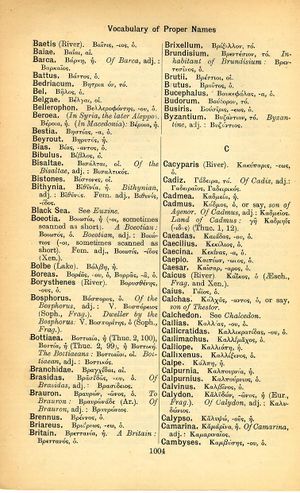Caecilius
ὦ δυσπάλαιστον γῆρας, ὡς μισῶ σ' ἔχων, μισῶ δ' ὅσοι χρῄζουσιν ἐκτείνειν βίον, βρωτοῖσι καὶ ποτοῖσι καὶ μαγεύμασι παρεκτρέποντες ὀχετὸν ὥστε μὴ θανεῖν: οὓς χρῆν, ἐπειδὰν μηδὲν ὠφελῶσι γῆν, θανόντας ἔρρειν κἀκποδὼν εἶναι νέοις → Old age, resistless foe, how do I loathe your presence! Them too I loathe, whoever desire to lengthen out the span of life, seeking to turn the tide of death aside by food and drink and magic spells; those whom death should take away to leave the young their place, when they no more can benefit the world
English > Greek (Woodhouse)
Κεκίλιος, ὁ.
Latin > English (Lewis & Short)
Caecĭlĭus: a,
I name of a Roman gens.
1 C. Caecilius, Cic. Fl. 36.—
2 Q. Caecilius Metellus, Cael. ap. Cic. Fam. 8, 8, 5; Cic. Fin. 5, 27, 82.—
3 His son of the same name, called also Balearicus, for his triumph over the Baleares, Cic. Brut. 74, 259; Flor. 3, 8, 1.—
4 Caia (Gaia) Caecilia, the Roman name of Tanaquil, Plin. 8, 48, 74, § 194.—
5 Caeciliae, daughters of Q. Cœcilius Metellus the elder, Cic. Dom. 47, 123.—
6 Caecilia, daughter of Metellus Balearicus, Cic. Div. 1, 44, 99, and 2, 40, 83.—
7 Caecilius Statius, a Roman comic poet, of the ante-class. per., of Gallic origin, contemporary with Ennius; his comedies were by the ancients considered equal to those of Plaut. and Ter., and by many even preferred to them, Varr. ap. Non. p. 374, 8; Cic. Opt. Gen. 1, 2; id. de Or. 2, 10, 40; id. Att. 7, 3, 10; id. Brut. 74, 258; Hor. A. P. 54 sq.; Quint. 10, 1, 99; Vulcatius Sedigitus ap. Gell. 15, 24.—
II Derivv.
A Cae-cĭlĭus, a, um, adj., Cœcilian, of Cœcilius: familia, Vell. 2, 11; cf.: lex de ambitu, Cic. Sull. 22, 62: lex de repetundis, Val. Max. 6, 9, 10: et Didia lex de legibus ferendis, Cic. Att. 2, 9, 1; id. Phil. 5, 3, 8; id. Dom. 16, 41; 20, 53; id. Sest. 64, 135.—
B Caecĭlĭā-nus, a, um, adj., Cœcilian: fabula, Cic. Att. 1, 16, 15: senex (in a comedy of Cæcilius), id. Rosc. Am. 16, 46: pater, Quint. 11, 1, 39; Cic. Tusc. 3, 23, 56: cerasa, Plin. 15, 25, 30, § 102: lactuca (named after Q. Cæcilius Metellus), id. 19, 8, 38, § 127; cf. Col. 10, 182.—Also,
2 Caecĭlĭānus, i, m., a Roman cognomen, Tac. A. 3, 37; 6, 7; 16, 34.
Latin > French (Gaffiot 2016)
Cæcĭlĭus,¹⁰ ĭī, m., Cæcilius Statius, poète comique de Rome : Cic. de Or. 2, 50 || nom d’une gens à laquelle appartenait la famille des Métellus : Cic. Fl. 36, etc. || -us, a, um, de Cæcilius : Cæcilia Didia lex Cic. Phil. 5, 8, loi Cæcilia-Didia [proposée par Cæcilius et Didius || Cæcĭlĭānus, a, um, de Cæcilius : Cic. Tusc. 3, 56 ; Cæciliana cerasa Plin. 15, 102, sorte de cerises rondes ; lactuca Plin. 19, 127, laitue pourprée || subst. m., nom d’homme : Tac. Ann. 3, 37, etc.
Latin > German (Georges)
Caecilius, a, Name einer berühmten plebejischen gens, deren bedeutendste Familie die Metelli (s. 1. Metellus) waren u. in der die Beinamen Denter, Bassus, Rufus, Pinna u.a. vorkommen. – Hier sind bes. zu erwähnen: Q. Caec. Metellus, 148 v. Chr. Prätor mit der Provinz Mazedonien, wegen verschiedener Siege u. eines Triumphs über diese Pr. mit dem Bein. Macedonicus, Cic. de fin. 5, 82. – Dessen ältester Sohn Q. Caec. Metellus, Konsul 123 v. Chr., wegen eines Sieges u. Triumphs über die Balearen mit dem Beinamen Balearicus, Cic. Brut. 259. Flor. 3, 8, 1. – Dessen Schwestern (Töchter des Maced.) Caeciliae, Cic. de dom. 123. – Dessen Tochter Caecilia (Mutter des Prätors Appius Klaudius u. des Volkstribunen Klodius), Cic. de div. 1, 4 u. 99. – C. Caecilius (Statius), ein ausgezeichneter röm. Komiker, Zeitgenosse des Ennius, starb um 168 v. Chr., Cic. de opt. gen. 2. Quint. 10, 1, 99. Hor. art. poët. 53. Vgl. W. Teuffel Geschichte der röm. Literat.5 § 106. – Dav.: A) Caecilius, a, um, cäcilisch, familia, Vell.: lex (de ambitu), Cic. – B) Caeciliānus, a, um, cäcilianisch, fabula (des Cäcilius Statius), Cic.: senex (in einer seiner Komödien), Cic.: lactuca (nach Q. Caecilius Metellus benannt), Plin.

